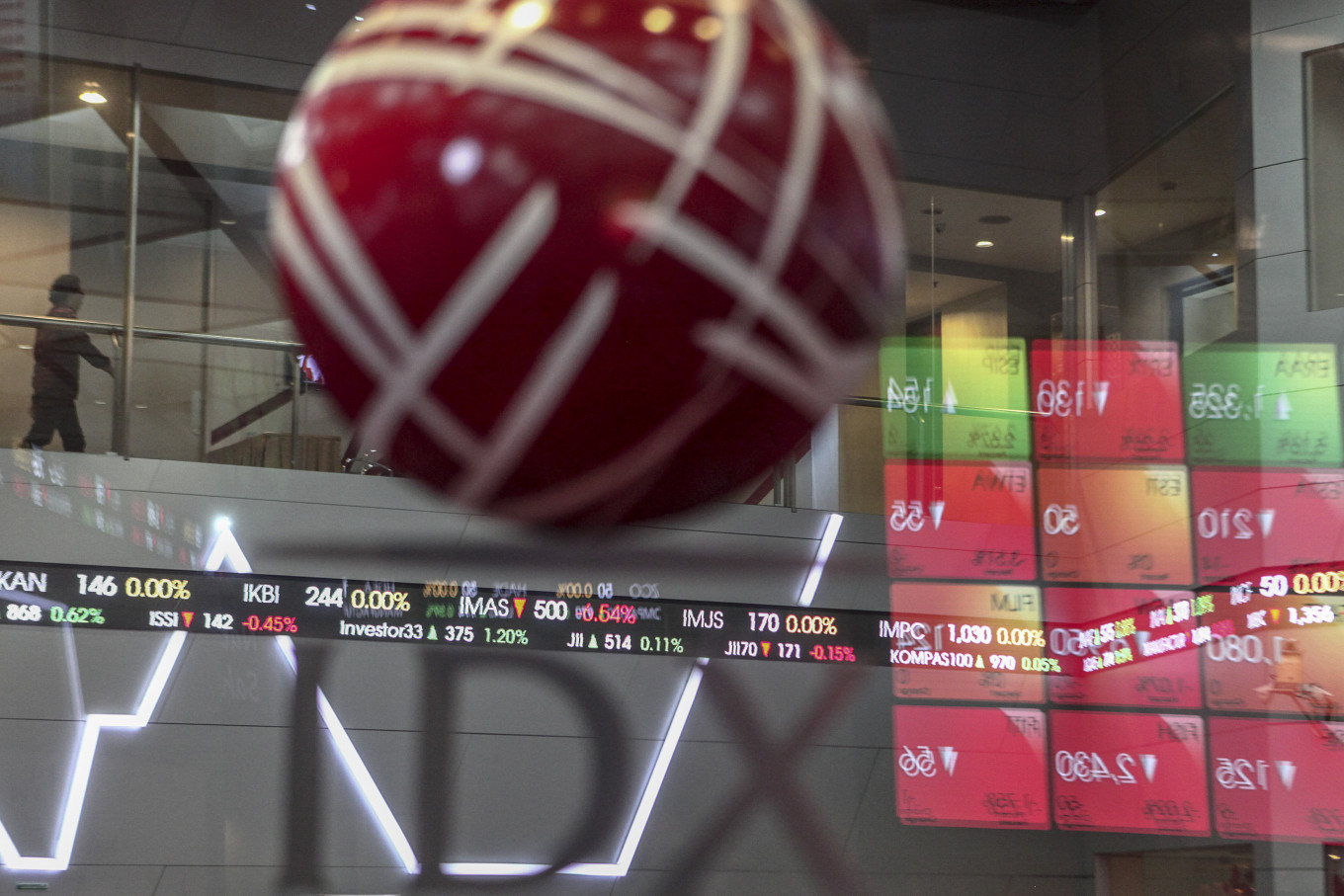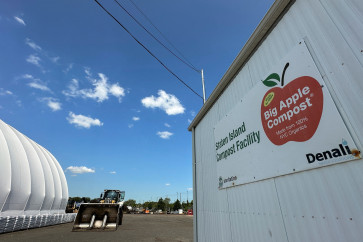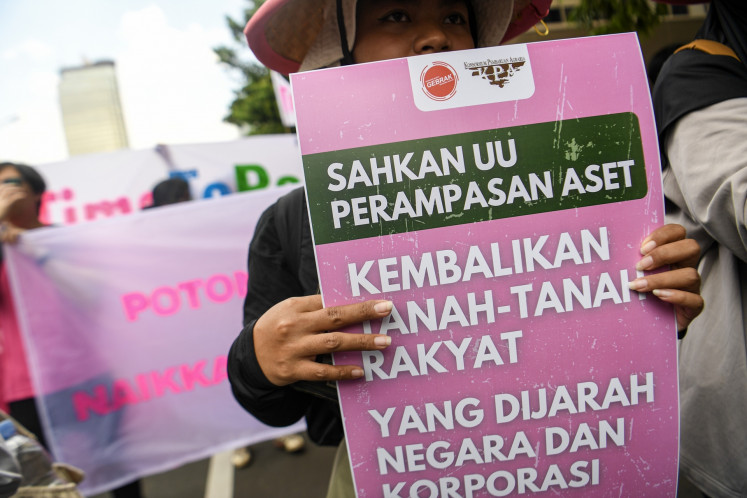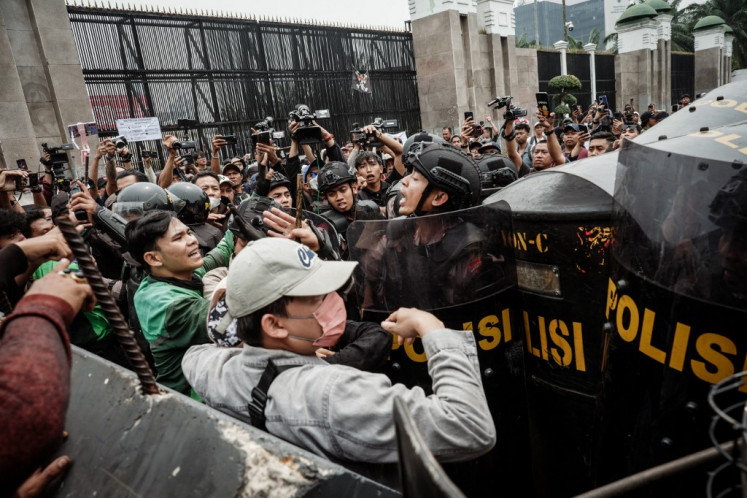Popular Reads
Top Results
Can't find what you're looking for?
View all search resultsPopular Reads
Top Results
Can't find what you're looking for?
View all search resultsStocks rise as investor confidence returns
The Jakarta Composite Index (JCI), the main gauge of the Indonesia Stock Exchange (IDX), climbed by 2.89 percent to 5,161.82 against the previous trading day, continuing last Friday’s rally of 2.56 percent.
Change text size
Gift Premium Articles
to Anyone
T
he Indonesian stock market rebounded on Monday, the first day of the reimposition of large-scale social restrictions (PSBB) to contain COVID-19 in Jakarta, after the market crash last week, as investor optimism was restored as a result of the limited impact of the measures on businesses.
The Jakarta Composite Index (JCI), the main gauge of the Indonesia Stock Exchange (IDX), climbed by 2.89 percent to 5,161.82 against the previous trading day, continuing last Friday’s rally of 2.56 percent.
The market uptrend offset the dramatic plunge of 5.01 percent last Thursday, the lowest since March, to 4,891.46, which led to a half-hour trading halt as investors engaged in a panic sell-off. The market crash was sparked by the initial announcement of the reintroduction of PSBB amid the continuous rise in COVID-19 cases.
“Surprisingly, the measures in this reimposition of the PSBB are much milder than what the market initially expected,” Mirae Asset Sekuritas Indonesia head of research Hariyanto Wijaya told The Jakarta Post on Monday.
In a Mirae Asset Sekuritas report published on Monday, cowritten by Hariyanto and analyst Emma A. Fauni, both researchers stated that the impact of the PSBB on earnings per share (EPS) should be less severe than expected, as non-essential businesses are still allowed to operate, despite limitations.
While the Jakarta administration decided to reintroduce the PSBB, as the country’s COVID-19 tally surpassed 221,500 cases on Monday, the curbs are viewed as more relaxed than the initial implementation in April.
During a press briefing on Sunday, Jakarta Governor Anies Baswedan announced that workplaces in 11 essential sectors – including health, food, energy, communications, finance, logistics and daily needs retail – would still be allowed to remain open at half capacity. Meanwhile, private companies outside these sectors as well as government offices must implement work-from-home policies and allow no more than 25 percent of their employees to work in the office at the same time.
Traditional markets and malls will also be allowed to operate at 50 percent visitor capacity, but restaurants and cafes will only be allowed to provide takeaway and delivery orders.
This is a stark contrast to April, when all places of worship had to be closed, malls and markets were allowed to open only for essential daily needs and nonessential companies had to get an Industry Ministry permit to operate.
Indonesia’s economy took a huge blow from the implementation of the PSBB in various regions, contracting by 5.23 percent year-on-year (yoy) in the second quarter, as all components of economic activities fell.
As the administration still allows malls, markets, restaurants and offices to operate, albeit with stricter health protocols, the negative economic impact of the PSBB will not be significant, RHB Sekuritas analysts, Andrey Wijaya, Michael Setjoadi and Andre Benas, wrote in a statement.
Meanwhile, Adrianus Bias Prasuryo, head of research at Sucor Sekuritas, told the Post that the impact of the PSBB on the market had largely been priced in and that in the next two weeks its impact would be relatively neutral, although the market was still anticipating the results of the measure.
Adrianus went on to note that telecommunications, towers, banks and consumer stocks would not be affected and would tend to benefit from the PSBB, while hospitality, poultry, transportation and retail would be among the hardest-hit sectors throughout the PSBB implementation.
“The impact on the retail sector will be considerable despite malls still opening, as we anticipate traffic remaining low because of dine-in restrictions,” Adrianus explained.
IDX data show that the infrastructure, utilities and transportation sector rallied by 3.10 percent on Monday, the finance sector by 3.25 percent while the consumer goods sector rose by 1.56 percent.
Mirae Asset Sekuritas analysts, in its research note, also stated that it retained its current top picks of companies in the consumer goods, cement and commodities sectors.
The consumer goods companies, namely food manufacturing giant PT Indofood Sukses Makmur (INDF) and its subsidiary PT Indofood CBP Sukses Makmur (ICBP), are expected continue to book a positive performance as the work-from-home policy should positively affect the demand for consumer staples, the note reads.
Budi Himat, director for investment strategy at Bahana TCW Investment Management, stated that considering the data on hospital bed occupancy rates and the rise in COVID-19 cases, the PSBB was “a good policy”.
“When the policy response is in line [with the problem], the market should demonstrate good faith,” Budi told the Post on Monday.
He added that the acceleration of disbursement of the COVID-19 relief programs would contribute positively to the stock market.
Indonesia has only spent around Rp 237 trillion (US$15.92 billion), 34.1 percent, of its Rp 695.2 trillion stimulus programs so far, six months since the beginning of the outbreak.










